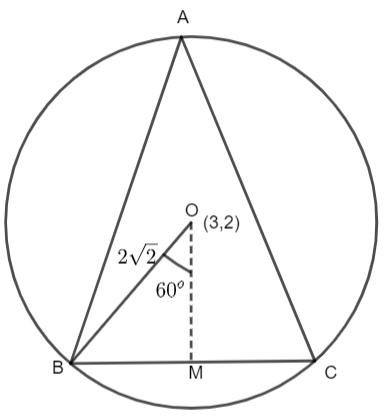Question
Question: If an equilateral triangle is inscribed in the circle \[{{x}^{2}}+{{y}^{2}}-6x-4y+5=0\] then the len...
If an equilateral triangle is inscribed in the circle x2+y2−6x−4y+5=0 then the length of its side is
(a)6
(b)26
(c)36
(d)46
Solution
To solve this question, compare the given equation of the circle to (x−p)2+(y−q)2=r2 to get the radius r of the circle and centre (p, q) of the circle. To calculate (x−p)2 and (y−q)2 use the formula (a−b)2=a2+b2−2ab. Finally after calculating the radius, use the circle theorem, the angle subtended by an arc on the centre of the circle is twice at the circumference to get the length of the triangle.
Complete step by step answer:
Given that the equation of the circle is
x2+y2−6x−4y+5=0......(i)
We know that the standard equation of the circle with the centre at (p, q) and the radius r is given by
(x−p)2+(y−q)2=r2.....(ii)
Using equation (i) and equation (ii), we will try to calculate the radius r of the given circle. Consider equation (i).
x2+y2−6x−4y+5=0
By adding and subtracting 4 and 9, we will get
⇒x2−6x+9−9+y2−4y+4−4+5=0
⇒(x2−6x+9)+(y2−4y+4)−9−4+5=0
Using the formula, (a−b)2=a2+b2−2ab in the above term (x2−6x+9) and (y2−4y+4), we get,
Equation of circle=(x2−6x+9)+(y2−4y+4)−8=0
⇒Equation of circle=(x−3)2+(y−2)2=8
Comparing this from equation (ii), we get,
r2=8
⇒r=8
⇒r=22
Therefore, the radius of the circle is 22 and the centre of the circle is (p, q) = (3, 2). So, the situation is as below.

ABC is an equilateral triangle inscribed under the circle of radius 22 and centre (3, 2) = 0. Let us take the equilateral triangle to be of side a. We will drop a perpendicular on BC from O and name it as M. Now, because every angle of an equilateral triangle measure 60 degrees, we have,
∠BAC=60∘
Now, we have a theorem of the circle stated as “Angle subtended by an arc on the circle centre is double the angle subtended by the same arc on the circumference of the circle. Therefore, using this theorem, we have,
∠BOC=2×∠BAC
⇒∠BOC=2×60∘
⇒∠BOC=120∘
Now, because OM is perpendicular to BC, so angle BOC is bisected into two equal angles BOM and MOC.
⇒∠BOM=21∠BOC
⇒∠BOM=21×120∘
⇒∠BOM=60∘
Now, consider triangle BOM.
sin∠BOM=sin60∘=hypotenuse OBperpendicular BM
As, OB=radius r of the circle=22 , we have
⇒sin60∘=22BM
We know that sin60∘=23 , so we can write that
BM=23×22
⇒BM=6
Then the length of BC is
BC=2BM
⇒BC=26
So, the side of the equilateral triangle ABC is 26.
So, the correct answer is “Option B”.
Note: Another method to find the radius of the circle is given by if the equation of the circle is ax2+2bxy+by2+2gx+2fy+c=0 then the radius of the circle =g2+f2−c. Here we had x2+y2−6x−4y+5=0.
⇒a=1;b=1;h=0;2g=−6
⇒g=−3
2f=−4;c=5
⇒f=−2
Then the radius is given by 9+4−5=8=22. So, the radius of the unit is 22 units.
